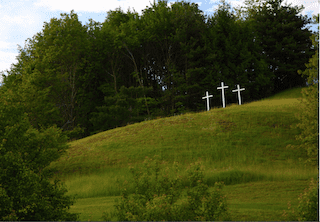“We’re actors – we’re the opposite of people!”
So stated the character called The Player in Tom Stoppard’s play Rosencrantz and Guildenstern are Dead, a fabulous production my family saw this past weekend at the American Shakespeare Center.
As an absurdist tragicomedy, the play did not disappoint. Life was random for Stoppard’s lead characters, who in the opening scene flipped coins and bet on tosses that always came up heads. Adding to the absurdity throughout the play, random characters arrived on stage and performed mute actions or delivered ambiguous speeches then exited.
Rosencrantz and Guildenstern bantered and quipped, at times rifting on the Lord’s Prayer: “Give us this day our daily cue.” Their desire for certainty. “Give us this day our daily mask.” Their desire for protection. “Give us this day our daily week.” Their desire for more time.
More often Rosencrantz and Guildenstern expressed confusion and distress, and rightly so. They were actors trapped in a play-within-a-play, Shakespeare’s Hamlet.
Actors – the opposite of people. Not human. The Player recognized this immediately.
“What are you playing at?” Rosencrantz asked Guildenstern.
“Words, words. They’re all we have to go on,” Guildenstern said.
Words. All they had to go on. Rosencrantz and Guildenstern had no clear memory of the past, no idea what was happening in the present, no free will, and no clear identity. In fact, they often didn’t know their own names or confused one for the other.
I smiled at their witty puzzlement, remembering my wordy existential teens in the 60s – Stoppard’s play dates from 1966. Discussions about faith did not satisfy me, an atheist back then. In this, I was like the playwright’s anti-existential actors: responsible for what happened without the benefit of higher laws or traditions.
So at sea were the actors that at one point they considered suicide. In the third act, when on they were on the boat to England, Rosencrantz said, “I wish I was dead.” He peered into the sea. “I could jump over the side. That would put a spoke in their wheel.”
“Unless they’re counting on it,” Guildenstern said.
Rosencrantz stepped back. “I shall remain on board. That’ll put a spoke in their wheel.”
They knew a decision either way made no difference. Their destinies were sealed. The last scene, taken directly from Hamlet, the ambassador from England announced: “Rosencrantz and Guildenstern are dead.”
 As I watched, I thought about two men whose choices had made all the difference. Two bandits caught in a series of events and crucified with Jesus, stripped of everything except their free will. Without masks, they had the opportunity to face themselves anew.
As I watched, I thought about two men whose choices had made all the difference. Two bandits caught in a series of events and crucified with Jesus, stripped of everything except their free will. Without masks, they had the opportunity to face themselves anew.
In Luke 23:39-43, we read that one chose to mock Jesus, to remain trapped in the play by going along with the crowd. The other confessed then asked to be remembered not for what the bandit had or hadn’t achieved but because of who he was. Human.
Jesus replied, “Truly I tell you, today you will be with me in Paradise.”
Faith and love, stronger than death. The essence of living.



0 Comments